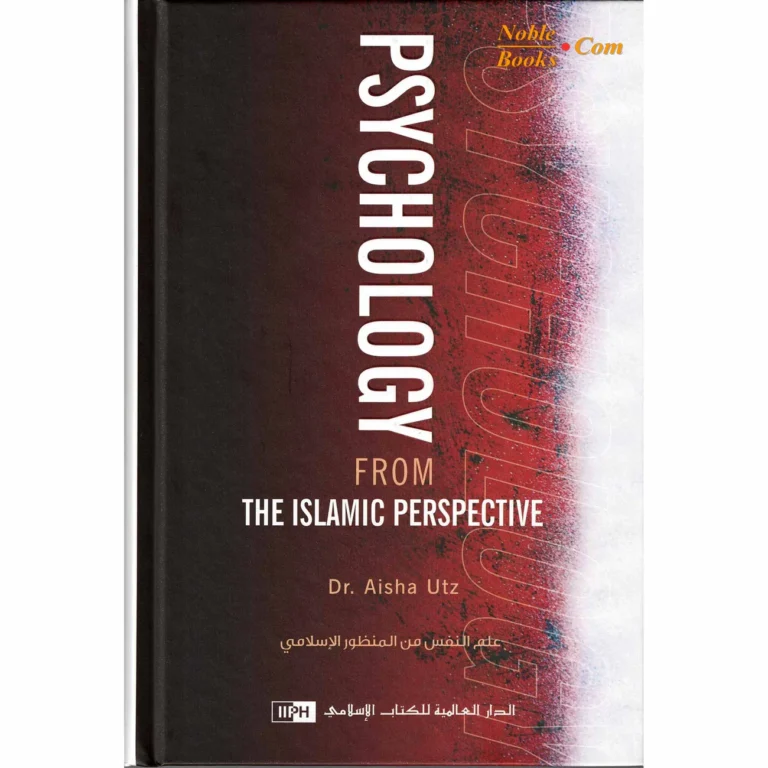“Aisha Utz’s “Psychology from the Islamic Perspective” provides much-needed relief from secular psychology by introducing a faith-centric model based on Qur’an and Sunnah. The book discusses the nature of the human soul (nafs), thoughts, behaviors, emotions, and spirituality from an Islamic perspective.”.
Rather than dividing the spiritual and psychological aspects, this book weaves together both to demonstrate how our psychological well-being is closely linked with our Iman and compliance with Allah. It defies the Western paradigm by re-setting the concept of the human mind according to Tawheed (monotheism) and divine guidance.
Aisha Utz: Bridging Psychology and Faith
Dr. Aisha Utz (née Kimberly C. Glazener) has a Ph.D. in Psychology and spent her professional life working towards a shift in the paradigm of mental health that honors Islamic principles. Her method is not merely intellectual it is religious, pragmatic, and transformative.
In this book, she tackles modern psychological issues while offering Islamic solutions that align with our values as Muslims. Through case studies and scholarly references, she provides clarity and relevance in a world full of confusion about mental health and identity.
Redefining the Concept of the Self (Nafs)
Western psychology tends to confine the “self” to the ego, mind, or personality. In Islam, though, the nafs encompasses the desires, inclinations of the soul as well as its moral consciousness. Aisha Utz discusses how the Qur’anic categorization of the nafs (such as nafs al-ammārah, nafs al-lawwāmah, and nafs al-muṭma’innah) provides greater insight into human development.
Through the acquisition of mastering and cleansing our nafs, we are able to attain genuine peace (sakīnah) and actualize our role as ‘abd (servant) of Allah. Psychology, from this perspective, becomes a method of tazkiyah (cleansing) instead of mere emotional consolation.
Mental Health in Light of Revelation
In contrast to secular models that are based on cognitive behavior or medication alone, Aisha Utz clarifies that true healing comes from spiritual harmony. Tawakkul (trust in Allah), ṣabr (patience), and dhikr (remembrance) are not only acts of devotion but are effective mental tools.
She offers illustrations of the means by which faith-based coping mechanisms based on the Prophetic model can ward off anxiety, depression, and despair. The book empowers Muslims to reestablish their relationship with their Creator in the course of emotional and psychological healing.
Gender, Identity, and the Islamic Worldview
The author also criticizes the way contemporary psychology tends to misrepresent human fitrah, particularly in terms of gender roles and sexuality. Aisha Utz reiterates that Islamic psychology honors the inherent differences between men and women while advocating for equality in spiritual value.
She contends that identity must be informed by Qur’anic values, rather than social constructs or trends. This chapter is especially helpful for Muslim youth who are juggling mixed messages regarding self-worth, beauty, and meaning in society.
Spiritual Intelligence Above Emotional Intelligence
Although emotional intelligence has been a buzzword in Western self-help circles, spiritual intelligence the capacity to comprehend life in terms of faith, submission, and eternal accountability is the focus of this book.
Dr. Utz describes how our everyday decisions, cogitations, and routines all reflect our relationship with Allah. The book instructs students to develop robust self-discipline (mujāhadah) and sincerity (ikhlāṣ), not solely for emotional mastery, but in order to achieve final success in both worlds.
Critique of Secular Theories and Practices
Throughout the book, Aisha Utz respectfully critiques influential psychological theories such as Freud’s psychoanalysis and Maslow’s hierarchy of needs. She describes how these theories commonly conflict with the Islamic worldview by excluding the functioning of divine will, the soul, and moral responsibility.
She cautions Muslims against the uncritical adoption of secular models of counseling and calls for the establishment of Islamic frameworks based on revelation, not experimentation and trends.
Parenting, Education, and Community Mental Health
One of the book’s strengths is how it applies practically. Aisha Utz provides guidance for Muslim parents, educators, and community leaders on raising emotionally and spiritually healthy individuals. Modeling prophetic behavior and the development of Iman-based values from childhood are a constant reoccurrence.
She also advocates for creating supportive Muslim communities where therapy and counseling are not stigmatized and where solutions based on faith are esteemed and taught.
Legacy and Relevance of the Book Today
“Psychology from the Islamic Perspective” remains a seminal work in Islamic psychology. It’s frequently suggested as required reading for students, counselors, imams, and all those interested in an integrated view of human behavior and spirituality.
In a world that is suffering from deteriorating mental health because of spiritual vacuity, this book reminds Muslims that true peace (ṭuma’nīnah) is found in living life grounded in the Qur’an and Sunnah.
Conclusion: A Return to the Heart
Aisha Utz’s book is not merely a book it’s a map home to the center of Islam. By re-centering psychology on the Creator and the last revelation, it brings hope, purpose, and identity back into an age of disarray.
This book is a requirement for anyone wishing to know themselves not in terms of passing worldly definitions but through divine wisdom’s eternal light.
Read more: Thewindowsinsider



